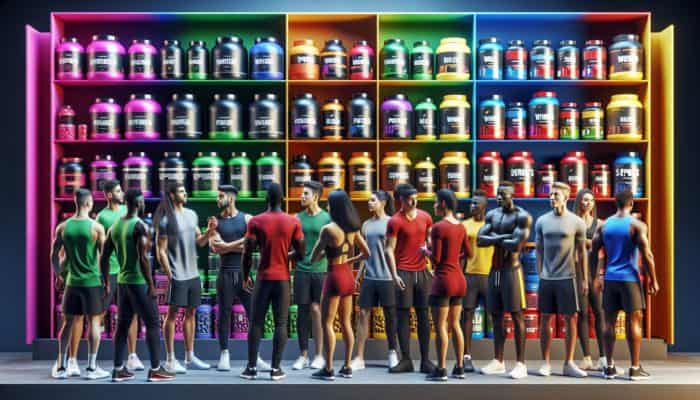Unleash the Full Potential of Young Athletes with Targeted Supplements for Enhanced Athletic Performance
For young athletes engaged in competitive sports, the relentless pursuit of excellence and personal growth is essential. The demanding nature of youth sports necessitates that athletes provide their bodies with the critical support they require. By incorporating the appropriate supplements for youth sports into their daily routines, young athletes not only experience significant improvements in performance but also enjoy quicker recovery times and enhanced overall health and well-being.
Boosting Athletic Performance for Young Sports Competitors

Maximising physical performance is vital for achieving success in youth athletics. Supplements specifically formulated for young athletes can greatly enhance their strength, speed, and endurance. For example, creatine and branched-chain amino acids (BCAAs) are commonly used to elevate energy levels and improve muscle functionality. Naturally found in foods such as red meat and fish, creatine boosts power output during high-intensity activities, leading to enhanced performance in sports like soccer, basketball, and running events.
Moreover, many young athletes benefit significantly from pre-workout supplements that include ingredients like caffeine and beta-alanine. These components can sharpen focus and extend endurance, enabling athletes to train harder and for longer durations. Research indicates that caffeine can enhance reaction times and reduce perceived exertion during workouts, making it a go-to option for young competitors seeking a competitive advantage.
However, it is essential to understand that while supplements for youth sports can aid in enhancing performance, they should supplement core training routines rather than replace them. A robust training regimen, paired with adequate nutritional support, significantly boosts an athlete's overall effectiveness and potential for success.
Accelerating Recovery for Young Athletes
Recovery is a critical component of any athletic training programme, particularly for young athletes still undergoing growth. Intense training sessions can lead to muscle soreness and fatigue, which can impede future performance. Specific supplements can facilitate faster recovery, enabling young athletes to heal more effectively and return to training sooner.
For instance, L-glutamine is renowned for its crucial role in muscle recovery following demanding workouts. This amino acid assists in replenishing glycogen stores and may promote muscle repair, making it particularly useful for athletes engaged in repeated high-intensity activities. Additionally, omega-3 fatty acids are acknowledged for their anti-inflammatory benefits, which can help alleviate muscle soreness and speed up recovery. Integrating omega-3 supplements, sourced from fish or algae, into a young athlete's diet can notably enhance their recovery capabilities.
Furthermore, ensuring proper hydration is vital for recovery and must not be neglected. Electrolyte supplements aid in restoring essential minerals lost through sweat, ensuring that young athletes remain hydrated and prepared for their next challenge. The balance of electrolytes like sodium and potassium is crucial for optimal muscle function, making these supplements an integral part of a comprehensive recovery strategy.
Essential Nutritional Support for the Growth of Young Athletes
Proper nutrition is the foundation of a young athlete’s training regimen; however, many struggle to meet their dietary needs due to various factors, such as busy schedules and lifestyle choices. In such instances, supplements for youth sports can effectively bridge nutritional gaps by delivering essential nutrients that promote overall health and athletic development.
Multivitamins are among the most sought-after supplements, specifically designed to provide young athletes with a comprehensive intake of vital vitamins and minerals essential for peak performance. These formulations typically encompass important nutrients like vitamin D, calcium, and iron, which are crucial for maintaining bone health and sustaining energy levels. A high-quality multivitamin can effectively support the nutritional requirements of young athletes, particularly those with restricted diets or specific dietary preferences.
Moreover, protein powders offer a convenient source of high-quality protein, essential for muscle repair and growth after exercise. Young athletes engaged in strength training or endurance sports may have increased protein requirements, making the incorporation of protein supplements vital for meeting their recovery needs.
Additionally, incorporating essential fatty acids and Probiotics can further enhance nutritional support. Probiotics are celebrated for their role in promoting gut health, which can subsequently improve nutrient absorption and bolster immune function—both crucial for maintaining peak performance throughout the sports season.
Uncovering the Diverse Range of Supplements That Support Young Athletes

For parents and coaches of young athletes, navigating the extensive supplement landscape can be overwhelming. Gaining a clear understanding of the various types of supplements available and their specific benefits can empower informed decision-making. Below are some of the most popular and effective supplements for youth sports that can enhance athletic performance and overall health.
Foundational Multivitamins for Optimal Athletic Health
Multivitamins function as fundamental supplements that are vital for supporting the health of young athletes. These comprehensive formulations typically encompass a wide array of essential vitamins and minerals necessary for various bodily functions. For instance, vitamin C strengthens the immune system, while B vitamins play a crucial role in energy metabolism and production.
The dietary habits of young athletes can vary greatly, influenced by lifestyle choices, personal preferences, and access to nutritious foods. As a result, they may not always obtain sufficient nutrients from their diet alone. A quality multivitamin can effectively address these gaps, ensuring that young athletes receive the necessary nutrition to support their physical activities and overall health.
Furthermore, multivitamins can enhance cognitive function, which is particularly beneficial in team sports that require strategic thinking and rapid decision-making. The mental aspects of competitive sports should not be underestimated; a well-nourished brain can result in improved focus and quicker reaction times during competitions.
Parents and guardians should seek out multivitamins specifically tailored for young athletes, as these products typically offer age-appropriate dosages and nutrient profiles designed to meet their unique developmental needs.
Premium Protein Powders for Optimal Muscle Support
For young athletes, meeting increased protein requirements is essential for muscle repair, growth, and overall recovery. Protein powders have become increasingly popular due to their convenience and efficacy. They are available in various forms, including whey, casein, and plant-based options, allowing for suitable choices tailored to any dietary preference.
Whey protein, derived from milk, is often preferred for its rapid absorption rate, making it ideal for post-workout recovery. It supplies the necessary amino acids needed to initiate muscle repair promptly after intense training sessions. Conversely, plant-based proteins, such as those sourced from peas or rice, provide suitable alternatives for individuals who may be lactose intolerant or prefer vegan options.
Integrating protein powder into smoothies or shakes enables young athletes to meet their daily protein goals without excessive calorie intake. This is particularly important for athletes striving to maintain optimal body composition while engaging in rigorous training regimens.
While protein powders can be beneficial, they should always be accompanied by a balanced diet rich in whole foods. Young athletes should not rely solely on supplements but rather utilise them to complement an all-encompassing nutritional strategy.
Electrolyte Supplements for Ideal Hydration and Performance

Maintaining a proper balance of electrolytes is essential for young athletes, especially during prolonged physical exertion. Engaging in sports results in the loss of vital minerals through perspiration, including sodium, potassium, and magnesium. Replenishing these electrolytes is crucial for hydration, muscle function, and the prevention of cramps.
Electrolyte supplements are available in various formats, including powders, tablets, and beverages, enabling young athletes to select the option that best aligns with their preferences and needs. Many formulations combine electrolytes with carbohydrates, offering an energy boost during extended exertion, making them ideal for sports like soccer, basketball, and long-distance running.
In addition to preventing dehydration, maintaining an electrolyte balance can enhance overall performance and endurance. Studies indicate that even mild dehydration can hinder physical performance, underscoring the necessity of effective hydration strategies.
Young athletes should be educated on the signs of dehydration and the importance of electrolyte replenishment, particularly during competitive events or intense training sessions. Implementing effective hydration strategies can significantly influence their performance and well-being.
Omega-3 Fatty Acids for Inflammation Reduction and Cognitive Support
Omega-3 fatty acids are widely acknowledged for their extensive health benefits, particularly in relation to reducing inflammation and supporting brain health. For young athletes, these essential fats can contribute to improved recovery and cognitive function—two critical elements of athletic success.
Scientific evidence suggests that omega-3 supplementation can effectively reduce inflammation, which is especially advantageous for athletes who frequently experience muscle soreness. By alleviating inflammation, young athletes can recover more swiftly from intense workouts and maintain consistent training schedules.
Moreover, omega-3 fatty acids are vital for brain health, which is indispensable for athletes who need to remain focused and alert during competitions. They support cognitive functions such as memory and reaction times, enabling young athletes to make rapid decisions in high-pressure scenarios.
Incorporating omega-3 supplements, whether through fish oil capsules or plant-based alternatives, can be transformative for young athletes aiming to enhance both their physical and mental performance. As with any supplement, it is crucial to select high-quality products that are sustainably sourced and free from contaminants.
Probiotics for Enhancing Gut Health and Nutrient Absorption
Maintaining gut health is increasingly recognised as a cornerstone of overall health and well-being. For young athletes, nurturing a healthy gut microbiome is essential for optimal nutrient absorption and immune function. Probiotics, which consist of live beneficial bacteria, can enhance gut health and meet the nutritional needs of actively developing young athletes.
Research indicates that a balanced gut microbiome can improve the absorption of nutrients vital for athletic performance, including amino acids and vitamins. This improvement can lead to enhanced recovery and better overall health outcomes for young athletes.
Probiotic supplements are available in various forms, such as capsules, powders, and fermented foods like yogurt. When selecting a probiotic, it is essential to choose one that contains a diverse range of bacterial strains to maximise benefits.
Young athletes should be encouraged to incorporate probiotics into their diets as part of a holistic approach to nutrition. By doing so, they can ensure they are supporting their digestive health and enhancing their performance both on the field and in daily life.
Understanding the Safety and Regulations Surrounding Supplements
The realm of dietary supplements can be complex, especially for young athletes who may encounter these products without adequate guidance. Understanding safety and regulatory frameworks is crucial for parents and coaches to make informed decisions regarding supplements for youth sports.
Ensuring Quality in Supplement Selection
Selecting high-quality supplements is essential to ensure safety and efficacy. Reputable brands adhere to stringent manufacturing protocols, ensuring that their products are free from harmful contaminants and meet established safety standards. Parents and guardians should prioritise purchasing supplements from recognised companies with a demonstrated history of transparency and accountability.
Furthermore, seeking certifications from independent organisations that verify the quality of supplements is beneficial. Certifications from NSF International or the United States Pharmacopeia (USP) indicate that products have undergone rigorous testing for quality and purity. This additional layer of assurance is particularly important when considering products for young athletes, who may be more susceptible to the effects of impurities or inferior formulations.
Reading reviews and seeking recommendations from professionals in the field, such as nutritionists or sports trainers, can provide valuable insights into credible supplement brands. Awareness and diligence in selecting high-quality products can significantly impact a young athlete's health and performance.
Understanding the Importance of Age-Appropriate Supplement Dosages
In terms of supplements, a one-size-fits-all approach is inappropriate. Young athletes are still undergoing crucial stages of development, making it vital to choose supplements that are formulated with age-appropriate dosages. Overdosing on certain vitamins or minerals can lead to adverse health effects, highlighting the necessity for careful selection.
For instance, while protein is crucial for muscle growth, excessive protein intake can impose strain on the kidneys, especially in younger individuals whose bodies are still developing. Understanding the recommended daily allowances (RDAs) for various nutrients is essential for parents and guardians when considering supplements for their children.
Consulting healthcare professionals can provide tailored recommendations based on the individual needs of young athletes. By ensuring that supplements are suitable for their age and activity level, parents can help safeguard their athletes' health while supporting their performance goals.
Understanding Regulatory Compliance in the Supplement Industry
The supplement industry is not as closely regulated as the pharmaceutical sector, which can result in inconsistencies in product safety and labelling. Parents and guardians need to be aware of this landscape when selecting supplements for youth sports.
In various regions worldwide, including North America and Europe, regulations exist that govern the manufacturing and marketing of dietary supplements. In the United States, for example, the FDA does not pre-approve supplements; therefore, companies are responsible for ensuring their products are safe before they reach the market. This can lead to variability in the quality of supplements available to consumers.
To navigate this uncertainty, parents should seek brands that voluntarily comply with Good Manufacturing Practices (GMP) and have undergone third-party testing. These practices help ensure that supplements are manufactured safely and contain the labelled ingredients.
The Importance of Accurate Labelling in Supplement Selection
Accurate labelling is crucial for consumers to make informed choices regarding supplements. Young athletes and their guardians must understand that not all supplements are created equal, and misleading labels can lead to confusion and potential health risks.
Ingredients and dosages should be clearly listed on product labels, allowing consumers to comprehend precisely what they are consuming. A well-labelled product will include information on active ingredients, potential allergens, and any fillers or additives.
Parents should educate young athletes on how to read labels critically, emphasising the importance of understanding what they are consuming. By ensuring that products are accurately labelled, families can mitigate the risks associated with misinformation and make educated choices regarding their supplement intake.
The Benefits of Third-Party Testing for Supplement Safety
Third-party testing is a vital measure for verifying the safety and purity of supplements. Independent organisations evaluate products to ensure they meet safety standards and contain the advertised ingredients. For parents and guardians, selecting supplements that have undergone third-party testing can provide an additional layer of reassurance.
Common third-party certifiers include NSF International, Informed-Sport, and ConsumerLab. When a supplement carries one of these certifications, it indicates that the product has successfully passed rigorous testing for quality and contamination.
By prioritising supplements that have been third-party tested, young athletes and their families can make informed choices that safeguard their health while supporting their performance goals. This practice fosters trust in the products they select to aid their athletic journey.
Strategically Selecting the Optimal Supplements for Young Athletes
With a multitude of supplements available, choosing the right options for young athletes can be a challenging task. Employing a strategic approach ensures that these supplements effectively meet their needs while aligning with their health and performance objectives.
Consulting Experts for Personalised Recommendations
Engaging with healthcare professionals, such as registered dietitians, nutritionists, or sports trainers, is a valuable step in identifying the appropriate supplements for young athletes. These experts can evaluate individual needs, taking into account factors like the athlete's age, sport, training intensity, and dietary habits.
Consultations can yield personalised recommendations, ensuring that young athletes receive supplements specifically tailored to support their unique health and performance goals. Additionally, these professionals can provide guidance on how to incorporate supplements into an overall nutrition strategy.
Parents must recognise that while supplements can enhance performance, they should complement a balanced diet rather than replace healthy food choices. Professionals can help educate families about the importance of nutrition and the role supplements can play in achieving athletic goals.
Conducting Individual Needs Assessments for Tailored Support
Every young athlete is unique, and their nutritional requirements will vary based on numerous factors, including age, activity level, and individual health considerations. Conducting an individual needs assessment can help pinpoint specific deficiencies or areas for improvement.
For instance, athletes engaged in endurance sports may require more carbohydrates and electrolytes compared to those focused on strength training. Understanding these unique needs allows parents and guardians to make informed decisions about which supplements may provide the most significant benefit.
Moreover, monitoring the athlete's progress and any changes in energy levels or performance can guide ongoing adjustments to their supplement regimen. A personalised approach guarantees that young athletes receive the necessary support to thrive and succeed in their respective sports.
Budget-Friendly Supplement Choices for Families
Navigating the supplement market comes with financial considerations, especially for families with young athletes. The costs of supplements can vary significantly, making it essential to find options that fit within a budget while still offering quality.
Cost-effective supplements do not necessarily imply lower quality. Many reputable brands provide affordable options that do not compromise safety or efficacy. Families can research various products, compare prices, and explore sales or bulk purchasing opportunities to make supplements more financially accessible.
Additionally, prioritising needs based on the athlete's requirements can help in budgeting effectively. Concentrating on essential supplements, such as multivitamins and protein powders, may yield the most significant benefits without overspending.
Ultimately, maintaining a balanced approach to supplement selection can ensure that financial constraints do not hinder young athletes' nutritional support.
Integrating Supplements Seamlessly with Daily Nutrition
Supplements should complement a comprehensive diet rather than serve as substitutes. Understanding how to effectively integrate supplements for youth sports into daily nutrition can promote a holistic approach to health and athletic performance.
Emphasising Balanced Nutrition for Athletic Success
A well-rounded diet serves as the cornerstone of any young athlete's success. Nutrient-dense foods should form the foundation of their nutrition plan, providing essential macronutrients and micronutrients vital for growth, development, and athletic performance.
While supplements can help fill specific nutritional gaps, they should never replace whole foods. Fruits, vegetables, whole grains, lean proteins, and healthy fats are crucial for sustaining energy levels and promoting overall health. Young athletes should focus on consuming a diverse array of foods to ensure they obtain all the essential nutrients required for their active lifestyles.
Incorporating a variety of foods can also enhance the effectiveness of supplements. For example, consuming a protein supplement alongside a carbohydrate-rich meal can improve recovery by promoting glycogen replenishment. This synergy between diet and supplements can significantly contribute to optimal athletic performance.
Optimal Timing for Supplement Intake
The timing of supplement consumption can greatly influence its effectiveness. Young athletes should be aware of when to take specific supplements to maximise their benefits. For instance, protein supplements are most effective when taken shortly after workouts, as this timing aids in muscle repair and growth.
Electrolyte supplements should be consumed before and during prolonged physical activities to maintain hydration and energy levels. Similarly, multivitamins can be ingested with meals to enhance absorption, ensuring that nutrients are utilised efficiently.
Establishing a consistent routine for supplement intake can help young athletes cultivate healthy habits. By understanding the optimal timing for each supplement, they can better support their training and performance objectives.
Avoiding Over-Reliance on Supplements
While supplements can provide valuable support, young athletes must avoid becoming overly reliant on them. The primary focus should remain on a healthy diet as the main source of nutrients. Education on the importance of whole foods can help foster a balanced approach to nutrition and supplementation.
Parents should encourage young athletes to view supplements as tools to enhance their performance rather than quick fixes. Highlighting the significance of a solid nutritional foundation is critical for long-term success in sports.
Moreover, over-reliance on supplements can lead to potential health risks, including nutrient imbalances or excessive intake of certain substances. By fostering a healthy relationship with food and supplements, young athletes can maintain their health while pursuing their sporting aspirations.
Strategic Supplement Selection for Young Athletes
Choosing the appropriate supplements necessitates careful consideration of individual needs and requirements. Young athletes should collaborate with professionals to determine which supplements align most closely with their health and performance goals. This partnership can lead to informed and strategic choices that enhance overall well-being.
Additionally, parents can assist young athletes in evaluating potential supplements by reviewing ingredient lists and conducting brand research. This knowledge empowers young athletes to make informed choices that prioritise safety and effectiveness.
By focusing on high-quality products that meet specific needs, young athletes can achieve their goals more efficiently. Integrating supplements into a comprehensive nutrition plan can support their health while excelling in their respective sports.
Recognising the Potential Risks and Side Effects of Supplements
While supplements can deliver numerous benefits, it is vital to remain aware of the potential risks and side effects associated with their use. Understanding these risks can help parents and young athletes make informed decisions regarding supplements for youth sports.
Being Mindful of Allergic Reactions
Allergic reactions are a significant concern when incorporating supplements into a young athlete's regimen. Certain ingredients found in supplements, such as whey protein or specific flavourings, may trigger allergic responses in susceptible individuals. Common symptoms of allergies can include hives, swelling, or gastrointestinal distress.
Parents should meticulously review ingredient labels to identify any known allergens before allowing their young athletes to begin new supplements. Conducting patch tests or introducing one supplement at a time can help monitor for any adverse reactions.
Additionally, consulting with healthcare professionals before starting a supplement regimen can provide valuable insights, particularly for those with a history of allergies or sensitivities. This proactive approach can help mitigate potential risks and ensure that young athletes can safely benefit from their chosen supplements.
Addressing Digestive Issues Related to Supplements
Digestive discomfort is another potential side effect linked to supplements. Some young athletes may experience bloating, gas, or stomach upset, especially if they consume excessive amounts or have sensitivities to specific ingredients. Common culprits include protein powders and certain fibre-based supplements.
To minimise digestive issues, young athletes should gradually introduce new supplements and closely monitor their body's responses. Staying hydrated is also crucial, as adequate fluid intake can promote digestive health. Parents should encourage their young athletes to maintain balanced eating habits alongside their supplement usage, thereby reducing reliance on supplements alone.
If digestive discomfort persists, it may be beneficial to consult a healthcare professional to identify underlying issues or consider alternative options. Proper guidance can help young athletes avoid unnecessary discomfort while pursuing their athletic goals.
Long-Term Health Concerns Associated with Supplement Usage
The prolonged use of certain supplements can pose potential health risks, particularly for young athletes whose bodies are still developing. Overuse of some substances can lead to imbalances or adverse health outcomes, emphasising the importance of moderation and responsible usage.
For example, excessive intake of vitamins or minerals can lead to toxicity, resulting in serious health complications. It is crucial to adhere to recommended dosages and acknowledge that supplements should complement a healthy diet.
Parents should instil a mindful approach to supplement use in their young athletes, encouraging them to prioritise nutrient-rich foods and view supplements as an adjunct to a well-rounded nutrition plan. Regular check-ins with healthcare professionals can provide ongoing support and ensure that young athletes are on the right track for their health and well-being.
Inspirational Success Stories and Case Studies of Young Athletes
Real-life examples of young athletes who have successfully integrated supplements into their youth sports training routines can provide valuable insights. These narratives illustrate the potential benefits of using supplements responsibly and effectively.
Remarkable Improvements in Athletic Performance
Numerous young athletes have reported considerable enhancements in their performance after incorporating supplements into their training regimens. For instance, a teenage runner who added a protein supplement to her post-workout recovery routine noticed elevated energy levels and quicker recovery times. This positive change allowed her to train harder and achieve personal bests in her events.
In team sports, athletes have experienced similar improvements. A young soccer player made use of electrolyte supplements during training, leading to better hydration and increased endurance during matches. These performance enhancements translated into a greater ability to contribute to his team's success on the field, demonstrating the positive impact of well-chosen supplements.
Such success stories underscore the importance of individualised approaches to supplementation. Each athlete's unique needs and circumstances can yield diverse outcomes, highlighting the necessity for personalised strategies in supplement selection and usage.
Enhanced Health Outcomes Through Responsible Supplement Usage
Beyond improving performance, many young athletes have experienced better health outcomes through the responsible use of supplements. A notable case involved a young swimmer who faced nutrient deficiencies affecting her energy levels and overall health. By incorporating multivitamins and omega-3 supplements into her routine, she observed significant improvements in her energy and recovery, ultimately leading to a stronger immune system.
These enhancements not only boosted her athletic capabilities but also positively affected her daily life. This case highlights the vital connection between nutrition, health, and athletic performance, illustrating how strategic supplementation can foster both athletic and overall well-being.
The journey of young athletes can be greatly supported through careful selection and responsible use of supplements for youth sports. By prioritising quality, safety, and individual needs, families can empower their young athletes to thrive both on and off the field.
Frequently Asked Questions About Supplements for Young Athletes
What are the most beneficial supplements for young athletes?
Common beneficial supplements include multivitamins, protein powders, electrolytes, omega-3 fatty acids, and probiotics. Each serves a distinct purpose, supporting performance, recovery, and overall health.
Are supplements safe for youth?
While many supplements are safe, it is crucial to select high-quality products and adhere to recommended dosages. Consulting with healthcare professionals can provide tailored guidance based on individual needs.
How can I determine which supplements my child requires?
Consulting with a healthcare professional or sports nutritionist can help evaluate your child's specific dietary needs, activity levels, and health goals to identify suitable supplements.
Can supplements replace a healthy diet?
No, supplements are intended to complement a healthy diet, not substitute it. Whole foods provide essential nutrients that supplements cannot replicate entirely.
What are the risks associated with supplement usage?
Potential risks include allergic reactions, digestive discomfort, and long-term health concerns. It is essential to monitor usage and consult with professionals to mitigate these risks.
How should supplements be taken for optimal results?
The timing of supplements can significantly impact effectiveness; for example, protein supplements are best consumed post-workout, while electrolytes are most effective when ingested during intense activity.
Are there age limits for certain supplements?
Yes, some supplements have age-appropriate dosages. It’s essential to select products specifically formulated for young athletes and consult with professionals for expert guidance.
Can supplements aid in athletic recovery?
Yes, certain supplements, such as protein powders, omega-3 fatty acids, and electrolytes, can significantly enhance recovery by promoting muscle repair and hydration.
How can I ensure the quality of supplements I purchase?
Look for trusted brands that offer third-party testing and transparency in ingredient sourcing. Certifications from organisations like NSF International can also indicate product quality.
What role do multivitamins play in youth sports?
Multivitamins help fill nutritional gaps young athletes may experience, ensuring they receive essential vitamins and minerals necessary for optimal performance and overall health.
Connect with us on Facebook!
The Article Supplements for Youth Sports: Enhancing Performance and Health appeared first on https://athleticsupplement.com
The Article Supplements for Youth Sports: Boosting Health and Performance Was Found On https://limitsofstrategy.com

